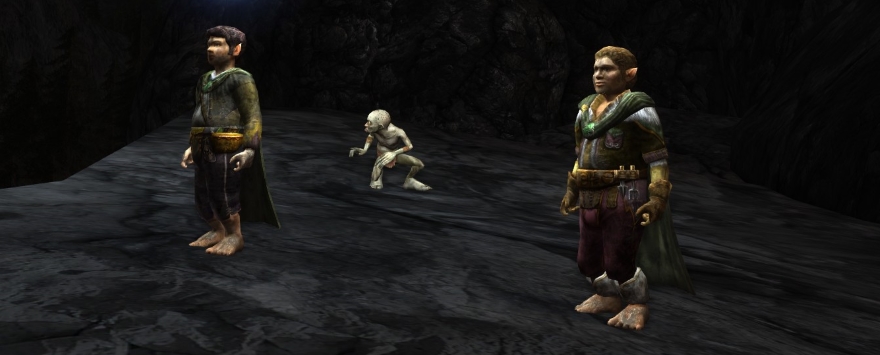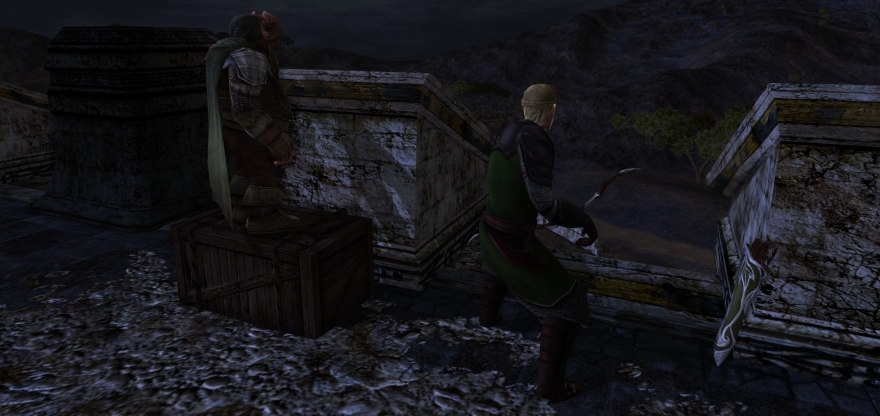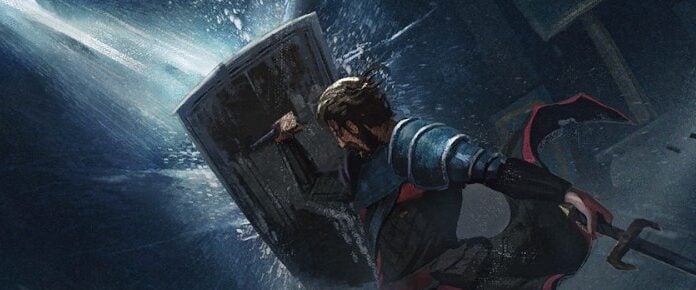
LOTRO, on the other hand, went a different way. The devs obviously felt that more players would want to adventure during the events of the books, especially since the story offered more details, characters, and conflicts. But that left the team with a different problem, which was how to insert player characters into a narrative that was rigidly defined by the trilogy. The solution, as we all well know, was to have the player be “a” hero, just not “the” heroes of the books. And this hero would go off on a story of his or her own that would in many ways parallel the Fellowship’s struggles but not slavishly stick by Frodo’s side as the invisible 13th member.
So how has LOTRO handled this concept of the player as a “second fiddle” over the years? I’ve been thinking about it a lot lately, particularly as we turn the bend into Mordor.
In the beginning
When you take a step back and look at the MMORPG over the past decade, you can see that the dev team has experimented greatly with the role of the player in the overarching story’s narrative. I’ve always seen it as a tug-o-war between two ends: Giving the player more freedom and mystery to chart his or her own path in the story (but veering far away from the Fellowship’s tale), and bringing the players into close contact with the Fellowship’s journey (while limiting the questing options and potential surprises).
At launch with Volume 1, players initially began by rubbing shoulders with many well-known characters from the book, but soon enough Frodo, Legolas, and Aragorn were off doing their own thing while we were sent on what I like to deem a “Middle-earth scavenger hunt” that explored other incidences and events going on in Eriador during the first book.
While Volume 1 certainly has its fans, I think the general consensus among both players and the devs by the time the first expansion rolled around was that the game was too far removed from the fanservice that Tolkien aficionados had shown up to see. Gradually over the next few expansions, players were brought back into more and more contact with the various members of the Fellowship and other key figures and events from the books.
Occasionally, the epic story (and even some side missions) would bring us into first-hand contact with the main cast of the books through quests that literally put us into the shoes of one of these characters to experience an important moment that our own player character was not there to witness. (This was usually told as a “flashback” of sorts.) Seeing the breaking of the Fellowship or even the recent vignette of Gollum betraying his master are total geek-out moments that help keep us tethered to the main narrative no matter what we are doing.
By the time we ended up in Rohan, the devs came up with another clever idea, which was to create a surrogate Fellowship that would offer players their own dedicated group that would foster a similar feel to what the main Fellowship was like. I particularly enjoyed having Horn, Nona, and Corudan join me on my adventures, and I have been a little dismayed when our Fellowship dissolved over the course of the epic.
Nowadays, players are pretty much right in the shirt pocket of the Return of the King (and have been for some time). The major story beats are happening, like the Battle of Pelennor Fields or the march to the Black Gate, and we have very little time and wiggle room for anything else. However, this is likely to change soon when the Mordor expansion releases later this year, since we’ll finally be in the post-One Ring era and stop being Frodo’s eternal shadow.
Heroes in training
While the format and structure of the quest line gets the most attention when we examine Standing Stone’s struggle to place us into the narrative, I think it’s equally important to look inside the quest text and objectives to see an added layer to our second-fiddleness. One theme that I’ve picked up in this game is that there is no one central hero, either NPC or player. Frodo is important, sure, but so is Sam, Aragorn, Eowyn, Faramir, and Sara Oakheart. Just kidding on that last one, of course. Lord of the Rings is a grand epic that looks at how this fictional history was shaped by the actions of many and how forging bonds of friendship and loyalty made all of the difference.
In other words, it’s not about just us. It never was. It’s about all of us.
That may be a strange concept coming from, oh, every other MMORPG out there that loves to pin you as the Chosen One (Neville Longbottom for life, yo!) and bend over backward at every opportunity to make you feel like the special and essential hero that the devs assume you fantasize about being. But who says that’s what we want? Sure, some might need the ego boost of being the central character of a personal narrative, but LOTRO is a great game for the rest of us who value friendship, fellowship, and selflessness more.
I’ve pontificated on this in the past, but I’ve greatly respected how LOTRO so often makes the point that tasks both great and small can be noble and heroic. I love that there are events greater than I, and that my character cannot (despite what my children think) single-handedly invade and destroy Mordor. We play in a world of heroes and cross paths with other heroes (and villains) quite often, and being part of an effort greater than yourself is both humbling and exhilarating.
It does make me a little concerned for Mordor, however. I truly hope that once the dev team gains more freedom of direction now that the books are almost over that it doesn’t go nuts with trying to “gift” us with a massive hero fantasy. Some of the interviews a couple of months back made it sound exactly like that, that getting away from the Fellowship’s adventures would allow us to be the starring hero of our own imaginary book. Again, I truly hope this won’t be the case. I would love to see our characters still be a part of something instead of that something being all about us. It’s not the game I’ve been playing and appreciating for 10 years.
 Every two weeks, the LOTRO Legendarium goes on an adventure (horrid things, those) through the wondrous, terrifying, inspiring, and, well, legendary online world of Middle-earth. Justin has been playing LOTRO since its launch in 2007! If you have a topic for the column, send it to him at justin@massivelyop.com.
Every two weeks, the LOTRO Legendarium goes on an adventure (horrid things, those) through the wondrous, terrifying, inspiring, and, well, legendary online world of Middle-earth. Justin has been playing LOTRO since its launch in 2007! If you have a topic for the column, send it to him at justin@massivelyop.com.














